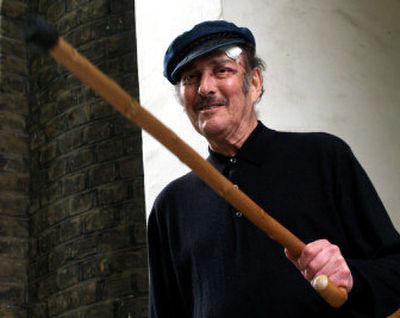Playwright Pinter awarded Nobel Prize for Literature

In honoring British playwright Harold Pinter on Thursday, Nobel Prize judges have again chosen an artist of literary achievement and political contention.
The 75-year-old Pinter, the most influential British playwright of his generation, is also an unrelenting critic of the U.S. involvement in Iraq, and of the government of Prime Minister Tony Blair.
“I think the world is going down the drain if we’re not very careful,” a frail but defiant Pinter, who has been treated for throat cancer in recent years, said to reporters outside his London home.
Pinter will receive $1.3 million for winning the Nobel, and can expect a boost in sales. His U.S. publisher, Grove/Atlantic, Inc., announced Thursday that it will print another 25,000 copies of a new collection of political writings, “Death Etc.” A volume of his plays has been climbing quickly on Amazon.com.
On Thursday, leaning on a cane and sporting a bandaged head after a fall, Pinter told reporters that he felt “quite overwhelmed” by the honor. “I have no idea why they gave me the award. I respect their judgment. I am very grateful,” he said.
Pinter continues a long tradition of Nobel laureates who believe in taking sides and not settling for art for art’s sake. Last year’s winner, Austria’s Elfriede Jelinek, once instructed her publishers to withhold the performance rights of her plays in Austrian theaters as long as the rightist Freedom Party was part of the government.
Pinter, the son of a Jewish tailor, was born in 1930 and was a rebel from an early age, declaring himself a conscientious objector and refusing to do then-compulsory military service. He was influenced by anti-Semitism and by the wartime bombing of London, when he would at times open the back door and “find our garden in flames.”
He published poetry under the name “Harold Pinta” and emerged as a playwright with “The Birthday Party” (1957).
The play established Pinter’s dark, distinctive style that relished the juxtaposition of brutality and the banal and could stop hearts with the conversational pause. His characters’ internal fears and longings, their guilt and unruly sexual drives, are set against the neat lives they have constructed to survive, a grim game in which actions often contradict words.
In “The Caretaker” (1959), which established him as a commercial and critical success, a manipulative old man threatens the fragile relationship of two brothers; “The Homecoming” (1964) explores the hidden rage and confused sexuality of an all-male household by inserting a woman.
Over time, his attention turned to the world at large. A vocal critic of the market economics of Margaret Thatcher in the 1980s — he said his vote for her in 1979 was “idiotic, infantile” — his work became more overtly political.
In 2003, Pinter published a volume of anti-war poetry about the current Iraq conflict. He later joined a group of celebrities calling for the impeachment of Blair, who sent British troops to Iraq.
In March 2005, Pinter announced his retirement as a playwright to concentrate on politics. But he created a radio play, “Voices,” that was recently broadcast on BBC radio to mark his 75th birthday, and said Thursday that he would continue writing poetry.
“And I’ll certainly remain deeply engaged in the question of political structures in this world,” he said.